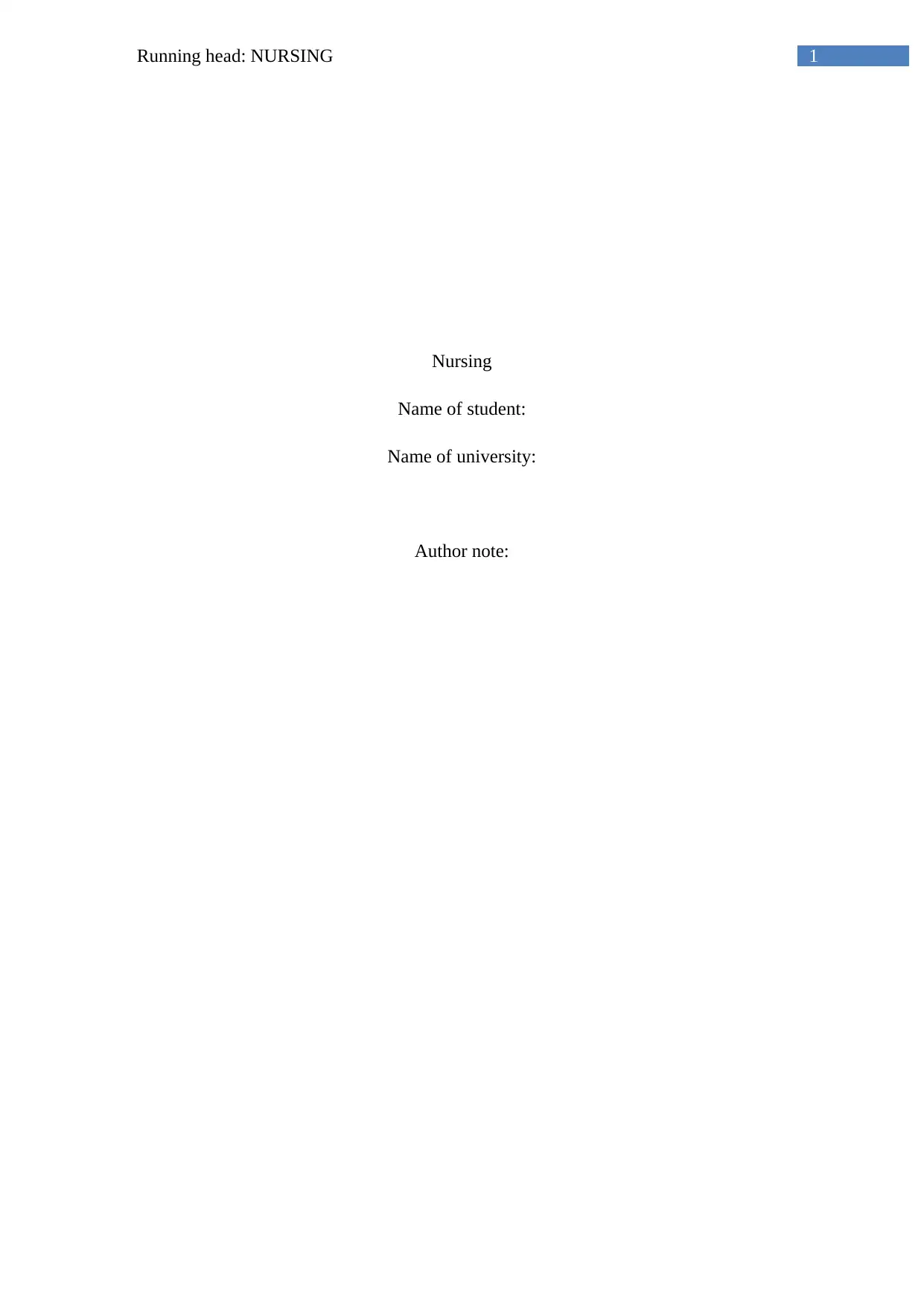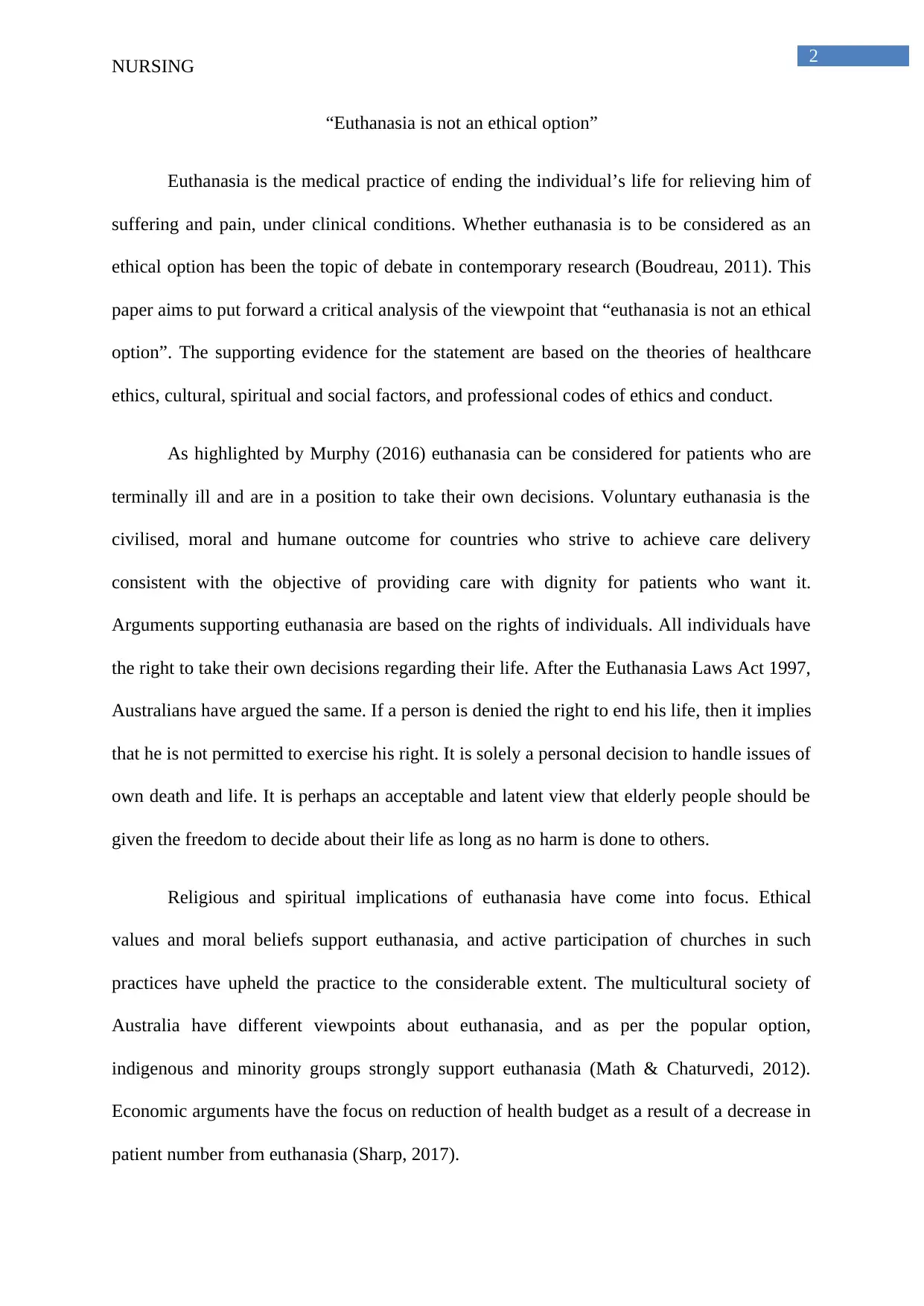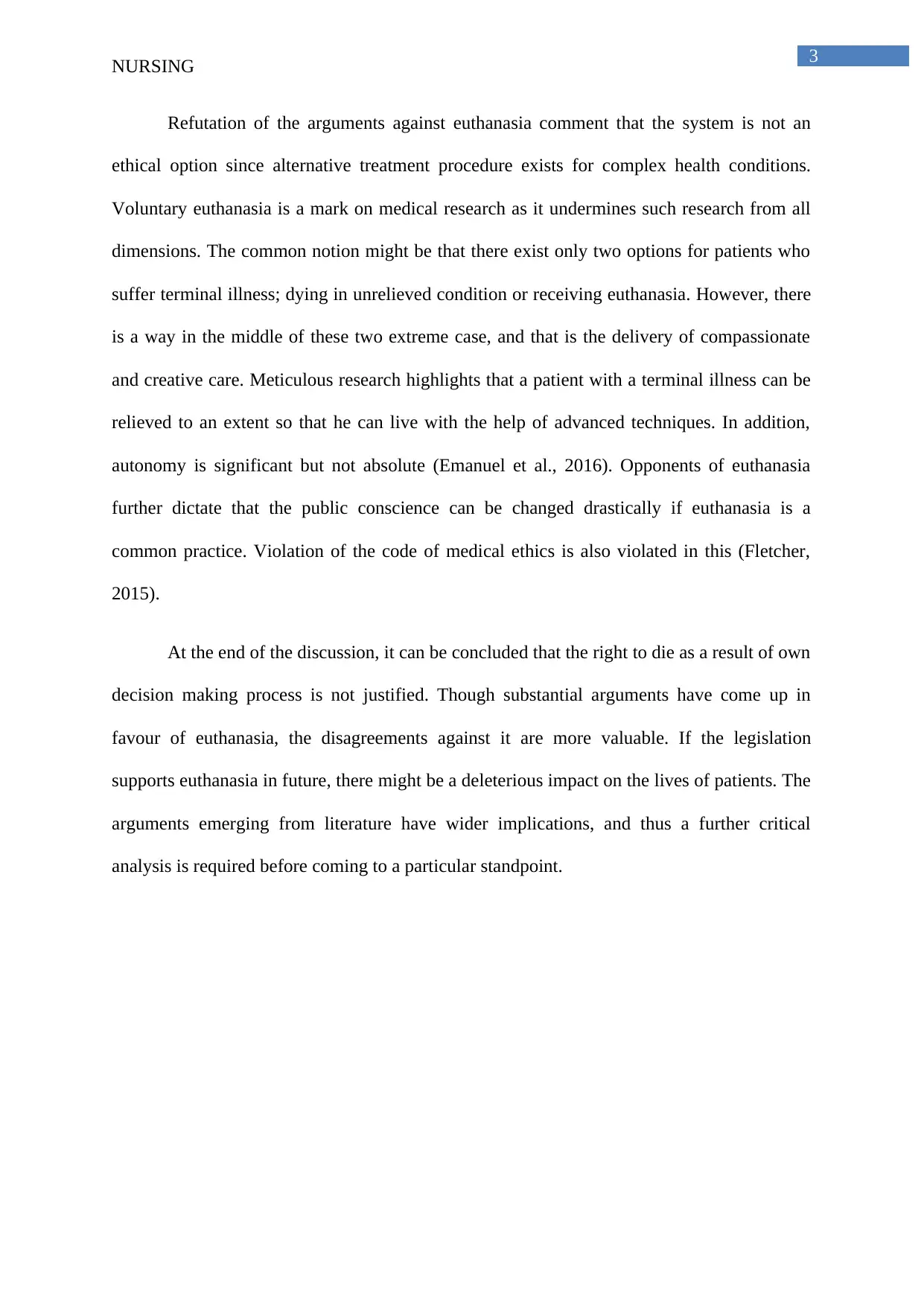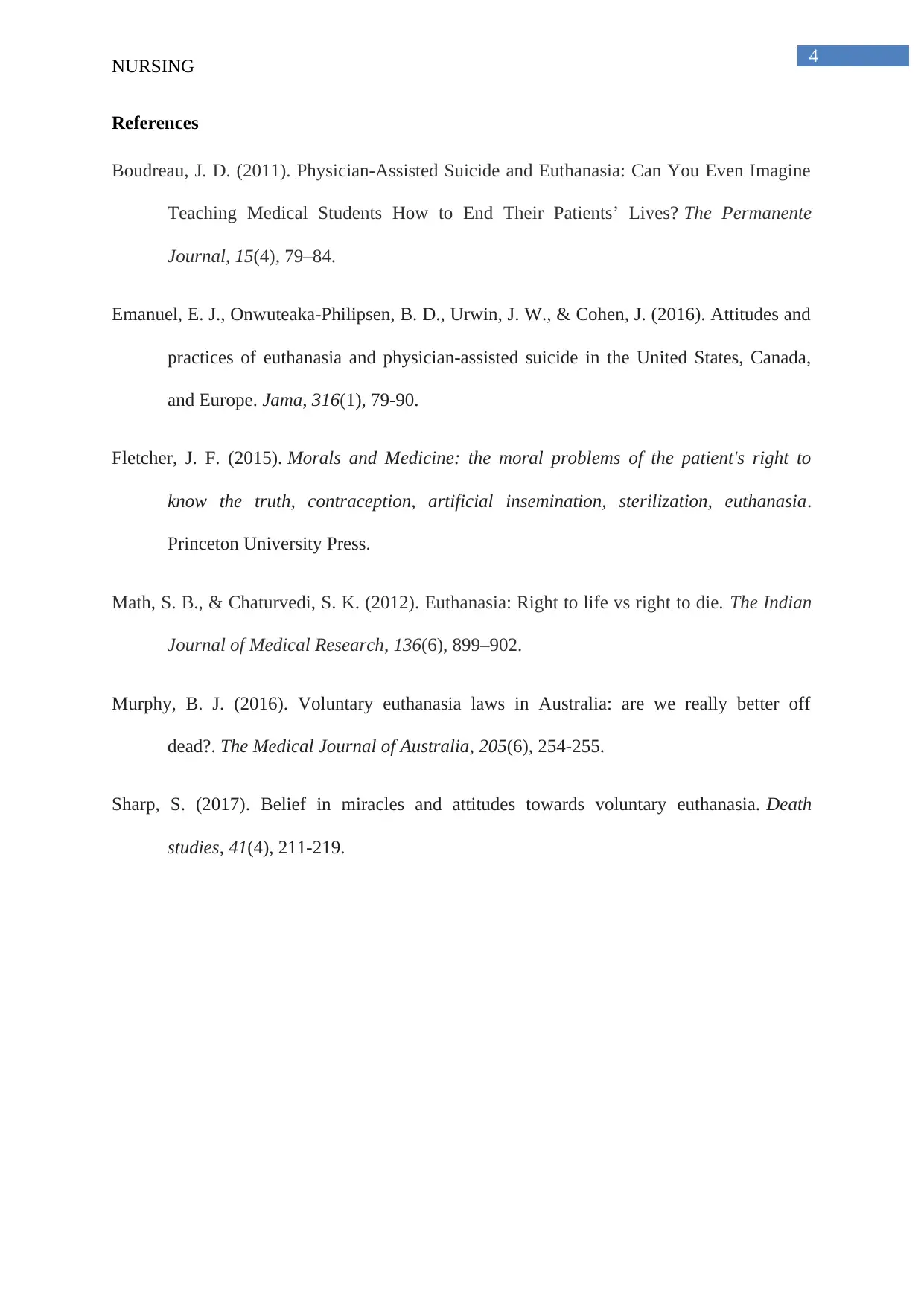Critical Analysis: Euthanasia as an Ethical Option in Nursing
VerifiedAdded on 2019/10/31
|4
|890
|199
Essay
AI Summary
This essay critically examines the ethical debate surrounding euthanasia, specifically addressing the viewpoint that it is not an ethical option. The author supports this stance by exploring arguments rooted in healthcare ethics, cultural, spiritual, and social factors, as well as professional codes of ethics and conduct. The paper analyzes arguments related to individual rights, religious and spiritual implications, and economic considerations, and refutes arguments supporting euthanasia. It concludes that, despite compelling arguments in favor of euthanasia, the counterarguments are more substantial, suggesting potential negative impacts on patients' lives if euthanasia is legalized. The essay emphasizes the need for further critical analysis before reaching a definitive conclusion, highlighting the complexities of end-of-life decisions.

1Running head: NURSING
Nursing
Name of student:
Name of university:
Author note:
Nursing
Name of student:
Name of university:
Author note:
Paraphrase This Document
Need a fresh take? Get an instant paraphrase of this document with our AI Paraphraser

2
NURSING
“Euthanasia is not an ethical option”
Euthanasia is the medical practice of ending the individual’s life for relieving him of
suffering and pain, under clinical conditions. Whether euthanasia is to be considered as an
ethical option has been the topic of debate in contemporary research (Boudreau, 2011). This
paper aims to put forward a critical analysis of the viewpoint that “euthanasia is not an ethical
option”. The supporting evidence for the statement are based on the theories of healthcare
ethics, cultural, spiritual and social factors, and professional codes of ethics and conduct.
As highlighted by Murphy (2016) euthanasia can be considered for patients who are
terminally ill and are in a position to take their own decisions. Voluntary euthanasia is the
civilised, moral and humane outcome for countries who strive to achieve care delivery
consistent with the objective of providing care with dignity for patients who want it.
Arguments supporting euthanasia are based on the rights of individuals. All individuals have
the right to take their own decisions regarding their life. After the Euthanasia Laws Act 1997,
Australians have argued the same. If a person is denied the right to end his life, then it implies
that he is not permitted to exercise his right. It is solely a personal decision to handle issues of
own death and life. It is perhaps an acceptable and latent view that elderly people should be
given the freedom to decide about their life as long as no harm is done to others.
Religious and spiritual implications of euthanasia have come into focus. Ethical
values and moral beliefs support euthanasia, and active participation of churches in such
practices have upheld the practice to the considerable extent. The multicultural society of
Australia have different viewpoints about euthanasia, and as per the popular option,
indigenous and minority groups strongly support euthanasia (Math & Chaturvedi, 2012).
Economic arguments have the focus on reduction of health budget as a result of a decrease in
patient number from euthanasia (Sharp, 2017).
NURSING
“Euthanasia is not an ethical option”
Euthanasia is the medical practice of ending the individual’s life for relieving him of
suffering and pain, under clinical conditions. Whether euthanasia is to be considered as an
ethical option has been the topic of debate in contemporary research (Boudreau, 2011). This
paper aims to put forward a critical analysis of the viewpoint that “euthanasia is not an ethical
option”. The supporting evidence for the statement are based on the theories of healthcare
ethics, cultural, spiritual and social factors, and professional codes of ethics and conduct.
As highlighted by Murphy (2016) euthanasia can be considered for patients who are
terminally ill and are in a position to take their own decisions. Voluntary euthanasia is the
civilised, moral and humane outcome for countries who strive to achieve care delivery
consistent with the objective of providing care with dignity for patients who want it.
Arguments supporting euthanasia are based on the rights of individuals. All individuals have
the right to take their own decisions regarding their life. After the Euthanasia Laws Act 1997,
Australians have argued the same. If a person is denied the right to end his life, then it implies
that he is not permitted to exercise his right. It is solely a personal decision to handle issues of
own death and life. It is perhaps an acceptable and latent view that elderly people should be
given the freedom to decide about their life as long as no harm is done to others.
Religious and spiritual implications of euthanasia have come into focus. Ethical
values and moral beliefs support euthanasia, and active participation of churches in such
practices have upheld the practice to the considerable extent. The multicultural society of
Australia have different viewpoints about euthanasia, and as per the popular option,
indigenous and minority groups strongly support euthanasia (Math & Chaturvedi, 2012).
Economic arguments have the focus on reduction of health budget as a result of a decrease in
patient number from euthanasia (Sharp, 2017).

3
NURSING
Refutation of the arguments against euthanasia comment that the system is not an
ethical option since alternative treatment procedure exists for complex health conditions.
Voluntary euthanasia is a mark on medical research as it undermines such research from all
dimensions. The common notion might be that there exist only two options for patients who
suffer terminal illness; dying in unrelieved condition or receiving euthanasia. However, there
is a way in the middle of these two extreme case, and that is the delivery of compassionate
and creative care. Meticulous research highlights that a patient with a terminal illness can be
relieved to an extent so that he can live with the help of advanced techniques. In addition,
autonomy is significant but not absolute (Emanuel et al., 2016). Opponents of euthanasia
further dictate that the public conscience can be changed drastically if euthanasia is a
common practice. Violation of the code of medical ethics is also violated in this (Fletcher,
2015).
At the end of the discussion, it can be concluded that the right to die as a result of own
decision making process is not justified. Though substantial arguments have come up in
favour of euthanasia, the disagreements against it are more valuable. If the legislation
supports euthanasia in future, there might be a deleterious impact on the lives of patients. The
arguments emerging from literature have wider implications, and thus a further critical
analysis is required before coming to a particular standpoint.
NURSING
Refutation of the arguments against euthanasia comment that the system is not an
ethical option since alternative treatment procedure exists for complex health conditions.
Voluntary euthanasia is a mark on medical research as it undermines such research from all
dimensions. The common notion might be that there exist only two options for patients who
suffer terminal illness; dying in unrelieved condition or receiving euthanasia. However, there
is a way in the middle of these two extreme case, and that is the delivery of compassionate
and creative care. Meticulous research highlights that a patient with a terminal illness can be
relieved to an extent so that he can live with the help of advanced techniques. In addition,
autonomy is significant but not absolute (Emanuel et al., 2016). Opponents of euthanasia
further dictate that the public conscience can be changed drastically if euthanasia is a
common practice. Violation of the code of medical ethics is also violated in this (Fletcher,
2015).
At the end of the discussion, it can be concluded that the right to die as a result of own
decision making process is not justified. Though substantial arguments have come up in
favour of euthanasia, the disagreements against it are more valuable. If the legislation
supports euthanasia in future, there might be a deleterious impact on the lives of patients. The
arguments emerging from literature have wider implications, and thus a further critical
analysis is required before coming to a particular standpoint.
⊘ This is a preview!⊘
Do you want full access?
Subscribe today to unlock all pages.

Trusted by 1+ million students worldwide

4
NURSING
References
Boudreau, J. D. (2011). Physician-Assisted Suicide and Euthanasia: Can You Even Imagine
Teaching Medical Students How to End Their Patients’ Lives? The Permanente
Journal, 15(4), 79–84.
Emanuel, E. J., Onwuteaka-Philipsen, B. D., Urwin, J. W., & Cohen, J. (2016). Attitudes and
practices of euthanasia and physician-assisted suicide in the United States, Canada,
and Europe. Jama, 316(1), 79-90.
Fletcher, J. F. (2015). Morals and Medicine: the moral problems of the patient's right to
know the truth, contraception, artificial insemination, sterilization, euthanasia.
Princeton University Press.
Math, S. B., & Chaturvedi, S. K. (2012). Euthanasia: Right to life vs right to die. The Indian
Journal of Medical Research, 136(6), 899–902.
Murphy, B. J. (2016). Voluntary euthanasia laws in Australia: are we really better off
dead?. The Medical Journal of Australia, 205(6), 254-255.
Sharp, S. (2017). Belief in miracles and attitudes towards voluntary euthanasia. Death
studies, 41(4), 211-219.
NURSING
References
Boudreau, J. D. (2011). Physician-Assisted Suicide and Euthanasia: Can You Even Imagine
Teaching Medical Students How to End Their Patients’ Lives? The Permanente
Journal, 15(4), 79–84.
Emanuel, E. J., Onwuteaka-Philipsen, B. D., Urwin, J. W., & Cohen, J. (2016). Attitudes and
practices of euthanasia and physician-assisted suicide in the United States, Canada,
and Europe. Jama, 316(1), 79-90.
Fletcher, J. F. (2015). Morals and Medicine: the moral problems of the patient's right to
know the truth, contraception, artificial insemination, sterilization, euthanasia.
Princeton University Press.
Math, S. B., & Chaturvedi, S. K. (2012). Euthanasia: Right to life vs right to die. The Indian
Journal of Medical Research, 136(6), 899–902.
Murphy, B. J. (2016). Voluntary euthanasia laws in Australia: are we really better off
dead?. The Medical Journal of Australia, 205(6), 254-255.
Sharp, S. (2017). Belief in miracles and attitudes towards voluntary euthanasia. Death
studies, 41(4), 211-219.
1 out of 4
Related Documents
Your All-in-One AI-Powered Toolkit for Academic Success.
+13062052269
info@desklib.com
Available 24*7 on WhatsApp / Email
![[object Object]](/_next/static/media/star-bottom.7253800d.svg)
Unlock your academic potential
Copyright © 2020–2026 A2Z Services. All Rights Reserved. Developed and managed by ZUCOL.





